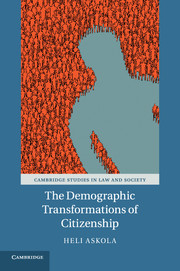Book contents
- Frontmatter
- Contents
- Acknowledgements
- 1 Introduction
- 2 Missing Citizens? Birth Rates and the Making of New Citizens
- 3 Misguided Citizens? Transitions into Adulthood and the Management of Diversity
- 4 Casual Citizens? The Desirable Labour Migrant and Conditional Citizenship
- 5 Depleting Citizens? Ageing Populations, Care and Migration
- 6 Conclusion
- Bibliography
- Index
- CAMBRIDGE STUDIES IN LAW AND SOCIETY
4 - Casual Citizens? The Desirable Labour Migrant and Conditional Citizenship
Published online by Cambridge University Press: 05 September 2016
- Frontmatter
- Contents
- Acknowledgements
- 1 Introduction
- 2 Missing Citizens? Birth Rates and the Making of New Citizens
- 3 Misguided Citizens? Transitions into Adulthood and the Management of Diversity
- 4 Casual Citizens? The Desirable Labour Migrant and Conditional Citizenship
- 5 Depleting Citizens? Ageing Populations, Care and Migration
- 6 Conclusion
- Bibliography
- Index
- CAMBRIDGE STUDIES IN LAW AND SOCIETY
Summary
This chapter discusses one of the major dimensions of the demographic transformation which has been unfolding in late-modern societies, the decline in the proportion of the working-age population as a result of longstanding lower birth rates, and the way governments in the Global North are using immigration to deal with the challenges posed by this decline. While population ageing is inevitable, governments, armed with demographic projections, are developing strategies to mitigate or postpone its economic impacts (most notably rising dependency ratios) through a combination of policies – such as those aiming at increased labour-force participation (e.g. by groups such as women and older people) and higher productivity, as well as increased levels of immigration. As the demographic ageing process advances over the next few decades, questions concerning labour migration and the issues raised by selecting and admitting immigrants with desirable profiles and turning (some of) them into citizens to counter population decline will become even more important than they are today. Unlike family migration, which is considered culturally problematic or assumed to be economically unproductive (as seen in Chapter 3), states consider some labour (im)migration to be essential for dealing with demographic challenges, though with the assumption that (potentially) large flows of low-skilled immigrants from the Global South have to be (and can be) kept at bay. Immigrants are thus seen as both a risk to the nation and vital for its survival, with states seeking to extract the maximum benefits from the resource migrants represent, while limiting the social and economic costs of permanent settlement. States' efforts at population engineering are thus increasingly geared towards identifying, admitting and retaining those immigrants who are most suited to their purposes – currently, skilled migrants in prime working age – and making sure only those most compatible with current priorities are steered towards permanent membership.
As a case study of how states seek to govern the resource (and risks) that labour migrants represent in changing labour markets, this chapter discusses Australia, a traditional country of settlement which has engaged in a partial deregulation of its immigration policy since the 1990s.
- Type
- Chapter
- Information
- The Demographic Transformations of Citizenship , pp. 107 - 146Publisher: Cambridge University PressPrint publication year: 2016



